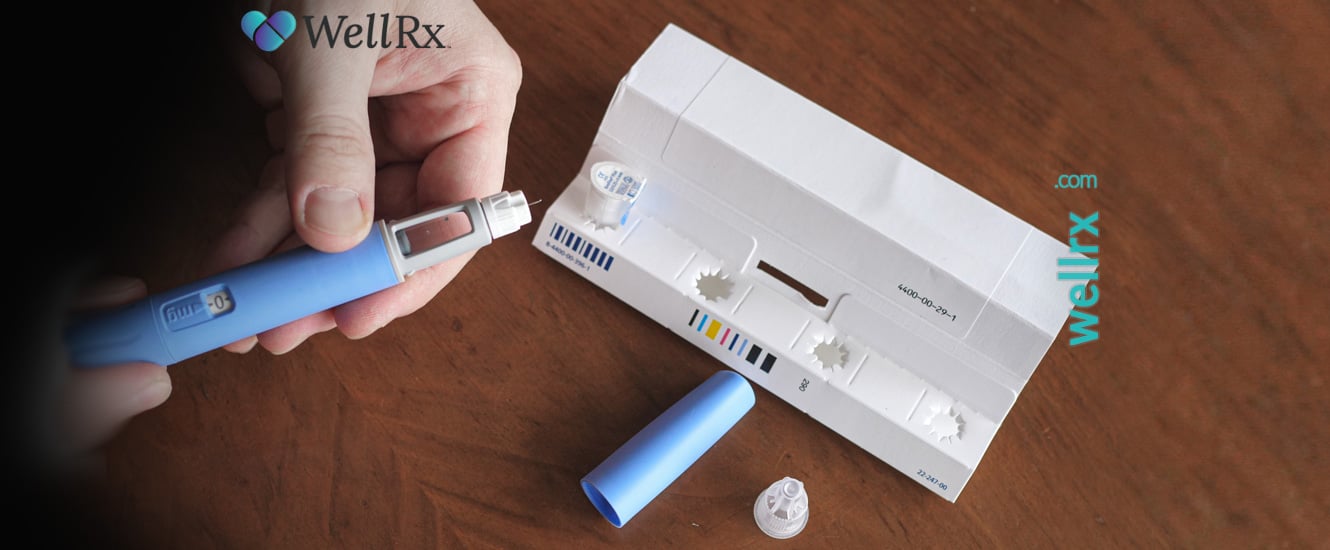You may have heard a lot on the news lately about a group of new treatments for diabetes and obesity called glucagon-like peptide-1 agonists or GLP-1s. These treatments are relatively new and are being widely advertised, especially for their use in obesity medicine. But what are GLP-1s and how do the medications compare?
GLP-1 medications were originally inspired by a protein that was isolated from the saliva of the Gila monster. It has an extremely slow metabolism and only has to eat once a year as a result of its exendin-4 protein which has similar properties to the GLP-1 medications.
Mechanism of action for GLP-1 therapy
Glucagon is a hormone made in the alpha cells of the pancreas. It provides a counterpart to insulin. While insulin drives glucose into cells and lowers the amount of sugar in your bloodstream, glucagon does the opposite. When you haven’t eaten for a long period or you’ve been exercising, your blood sugar may drop causing your body to release glucagon to raise and stabilize the blood sugar.
GLP-1 medications work by activating the receptors in the pancreas, which causes the pancreas to release more insulin and less glucagon. They also slow stomach emptying.
In promoting weight loss, GLP-1 medications work by decreasing appetite and increasing the feeling of fullness in the stomach. This combination usually results in weight loss. The relationship between the brain and the gut is complicated. These medications appear to not only work on the gut but also the brain. Weight loss associated with the GLP-1 medications ranges from 1.8 to 4.1kg (4-9 lbs) though some people have experienced significantly higher weight loss.
Indications for GLP-1 therapy
GLP-1 therapies are primarily used to treat type 2 diabetes, but they are being used more and more for weight loss. For diabetes, GLP-1s are used as a first-line medication alone or in combination with other medications for patients who have heart or kidney disease. For patients who do not have these other risk factors, GLP-1s are second or third-line medications.
Some of the same medications used for diabetes are marketed under different names for weight loss and management of obesity even in patients who do not have diabetes. These medications are generally indicated in patients who have a body mass index (BMI) of greater than 30, or who have a BMI of 27 with at least one weight-related condition such as high blood pressure, high cholesterol, or diabetes.
Side effects of GLP-1 therapy
Common side effects associated with GLP-1 medications include nausea, diarrhea, constipation, abdominal pain, heartburn, and reaction at the injection site. There are ongoing studies into whether there is a relationship between the use of these medications and inflammation of the pancreas, thyroid cancer, and pancreatic cancer. There is a growing concern regarding the use of this class of medication and the extreme slowing of stomach emptying and the intestinal tract (gastroparesis), and these medications shouldn’t be used if there is a history of severe gastroparesis.
People who have a family or personal history of certain types of thyroid cancer should not use these medications. Care should also be used in patients who have known gallbladder disease.
Medications in the GLP-1 class
There are several medications available in this class of medications. They vary in frequency of dosing as well as how they are administered.
Exenatide
Exenatide comes in two dosing frequencies. Byetta is dosed twice daily, and Bydureon is dosed once a week both by injection under the skin. In patients who have significantly decreased kidney function, these medications may not be the best choice. This is one of the first medications that was developed in this class, and the twice-daily form was approved in 2005 (the once-weekly form was approved in 2012). The weekly administration of exenatide appears to be more effective at lowering blood sugars than the twice-daily form of the medication. This medication is only indicated for the treatment of type 2 diabetes and is not considered first-line therapy.
Lixisenatide
This medication was another short-acting option for type 2 diabetes which was approved in 2016. Unfortunately, this medication was discontinued in early 2023. It was discontinued for business reasons (the manufacturer did not feel that sales were high enough to continue making the medication) and not because of a problem with the medication itself.
Liraglutide
Liraglutide (Victoza) was approved in 2010. It is dosed once daily as an injection under the skin. It was the first medication in the class that was released for once-daily use. Victoza can be used alone or in combination with other medications. Victoza is specifically approved for type 2 diabetes, but liraglutide is also marked under the brand name Saxenda approved for weight loss. Liraglutide appears to be more effective at reducing the A1c than Exenatide, especially the once-daily formation.
Dulaglutide
Dulaglutide (Trulicity) was approved in 2014 for type 2 diabetes. It is dosed once a week as a subcutaneous injection. Dulaglutide is effective at lowering blood sugar and can be used alone or with other medications for diabetes. It also appears to have a positive effect on cardiovascular health in high-risk patients. While it does not have an indication specifically for weight loss, weight loss is a known side effect of the medication. Dulaglutide appears to be more effective than twice-daily exenatide and as effective as liraglutide for the treatment of diabetes.
Semaglutide
Semaglutide is available as three medications in two dosing forms. Ozempic is administered as a once-weekly subcutaneous injection for type 2 diabetes. Wegovy is also administered as a once-weekly subcutaneous injection for weight loss. Rybelsus is currently the only GLP-1 medication, which is administered orally. It is taken once a day. Ozempic and Rybelsus can be used alone or in combination with other medications. It may also offer some cardiovascular protection in high-risk patients. Ozempic appears to have the best efficacy for lowering blood sugars and hemoglobin A1c. Semaglutide has been used for weight loss in children and adolescents, but it may increase the risk of gallstones. There have been shortages of the injectable forms of semaglutide (both Ozempic and Wegovy). This is likely related to increased demand because of the medication’s approval for weight loss even if you don’t have diabetes.
Tirzepatide
Tizepatide (Mounjaro) is unique because it works not only on the GLP-1 pathways but also affects the gastric inhibitory peptide (GIP) pathway. It is the only medication in this class. GIP is produced in the K cells in the upper intestine. Like glucagon, it acts to increase insulin levels and lower blood sugar. Tizepatide was approved in May 2022 for type 2 diabetes. It is considered a second-line medication for diabetes and is used when other medications are not effective. While tizepatide is not currently approved, by the FDA, for obesity, it is used off-label for this indication. It is administered once weekly as a subcutaneous injection. Because it works on more than one pathway, tizepatide is more effective at reducing blood sugars and improving hemoglobin A1c than medications that just work on the GLP-1 pathways. The most common side effects are nausea and diarrhea.
Nationwide shortage of GLP-1 receptor agonists
In 2023, there is a worldwide shortage of some of the GLP-1 medications. Many pharmacies are unable to keep a stock of medication for patients who have a valid prescription. It is believed that the shortage is related to an increased demand because of the use of medications for both type 2 diabetes and the treatment of obesity. This may be exacerbated by online-based prescribing and health spas that focus on the use of medications in the treatment of obesity. This has led to a recommendation to use the medications for only their approved indications. They also recommend using medications from across the class rather than focusing on one or two medications. If you are unable to get a reliable supply of medication, your healthcare provider may recommend restarting the medication at a lower dose to help avoid some of the side effects of the medication. The shortage of GLP-1 receptor agonist medications is not expected to improve until at least 2024.
Monitoring symptoms and discussing your concerns with your healthcare provider is one of the most important things that you can do. If your doctor has recommended GLP-1 therapy for type 2 diabetes or weight loss, or if you are on any other medication, consider the WellRx prescription discount to help find the best prices in your area. Prices vary across zip codes. Even pharmacies across the street from each other can have huge price differences.
Dr. Foglesong Stabile is a board-certified Family Physician who enjoys full scope Family Medicine, including obstetrics, women’s health, and endoscopy, as well as caring for children and adults of all ages. She also teaches the family medicine clerkship for Pacific Northwest University of Health Sciences.
References:
https://www.ncbi.nlm.nih.gov/pmc/articles/PMC3219279/
https://www.bmj.com/open-data/incretin
https://www.ncbi.nlm.nih.gov/books/NBK279127/
https://pubmed.ncbi.nlm.nih.gov/26371721/
https://elsevier.health/en-US/preview/glucagon-like-peptide-1-glp-1-receptor-agonists
https://www.ncbi.nlm.nih.gov/pmc/articles/PMC5397288/
https://www.obesity-abstracts.org/ob/0003/ob0003p1
https://www.ncbi.nlm.nih.gov/books/NBK518981/
https://journals.sagepub.com/doi/epub/10.1177/2042018821997320
https://reference.medscape.com/drug/victoza-saxenda-liraglutide-999449
https://www.aafp.org/pubs/afp/issues/2017/1015/p540.html
https://www.aafp.org/pubs/afp/afp-community-blog/entry/semaglutide-shortage-highlights-inequities-in-diabetic-medication-access.html
https://www.ncbi.nlm.nih.gov/books/NBK572151/
https://www.ncbi.nlm.nih.gov/pmc/articles/PMC4020673/
https://www.nejm.org/doi/full/10.1056/NEJMoa2206038
https://www.ncbi.nlm.nih.gov/pmc/articles/PMC4119845/#:~:text=In%20patients%20with%20type%202,result%20of%20promoting%20weight%20loss.
https://pharmaceutical-journal.com/article/news/government-declares-national-shortage-of-glp-1-receptor-agonists-for-type-2-diabetes-until-2024
https://www.ncbi.nlm.nih.gov/pmc/articles/PMC10338283/













 Store & manage your medication list
Store & manage your medication list Medication pricing updates
Medication pricing updates Pill & refill reminders
Pill & refill reminders Medication journal & mood log
Medication journal & mood log